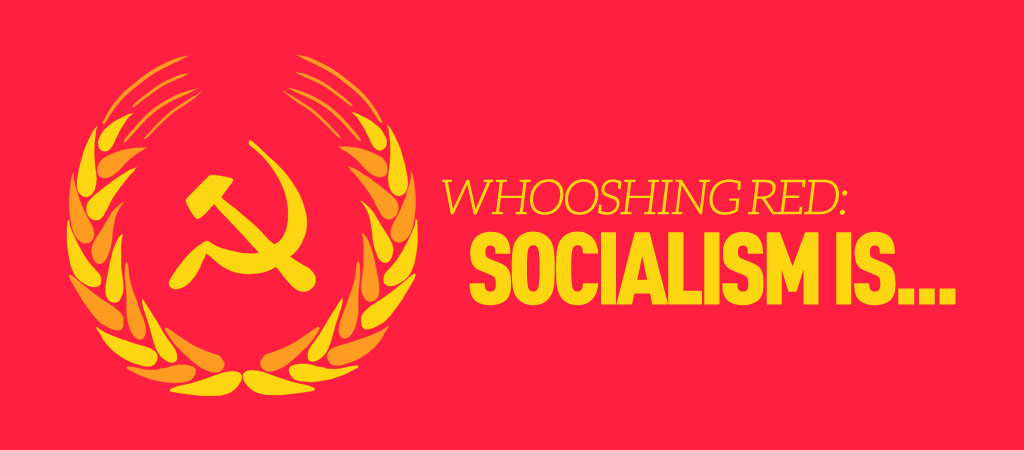
The Cold War ended with the red flag lowering over the Kremlin in 1991; 30 years later, The Hill reports that 70% of millennials would vote for a socialist. Gallup reports that about half of them prefer socialism over capitalism outright. Three decades of neoliberal hegemony — and the… mixed results thereof — look to have caused America’s youth to lose faith in capitalism and look for alternatives… including socialism.
But the Cold War casts a long shadow. Misconceptions about socialism — some of them derived from America’s own propaganda, and some of them derived from trying to cast it off — are common; it’s natural, after the 45 years where socialism in the U.S. was treated like a shadow that lurked in every corner, never to be examined, but always to be feared.
My goal in writing this quick primer is to argue against some common incorrect notions of what socialism actually is, what it consists of, or what it results in — because, ultimately, the creation of a strong and vibrant socialist movement needs an understanding of its aims, its foundations, and its past. And, logically, there’s no better place to start than the most enduring example of socialism in the public eye — the Soviet Union.
Socialism is what caused the Soviet Union to collapse
If this were true, the Soviet Union would have collapsed before it even existed, in the period between 1917 and 1922, when the multinational Union of Soviet Socialist Republics only existed as the unitary Russian Soviet Federative Socialist Republic.
The thing is: it didn’t. In fact, the early Soviet Union managed to survive a brutal and complex civil war involving 7-12 million total casualties, intervention by every great power in the world, the remnants of the First World War, and a complex network of different sides ranging from proto-fascists to local defense militias to even anti-Bolshevik socialists (which attests to just how many variations of socialism there are). And after the Russian Civil War, the new Soviet Union overcame sanctions and rejection from other nations to install itself as a global superpower. If socialism as a concept — or even the Soviet socialist system — had some inherent fatal flaw, it took a long, long time to show itself.
The actual causes of the Soviet collapse are complicated and not often discussed in the West. The most important cause was the emergence of an unofficial class of black marketeers, who Soviet premier Mikhail Gorbachev empowered without actually giving legal sanction. As a result, his reforms under glasnost made this proto-class much more powerful but restricted the legitimacy of their activities, so naturally, they started to agitate for the abolition of the Soviet system altogether.
Other causes, less central but important to note, include the massive decline in the Soviet workforce due to its losses in World War II; the need to continually support a large socialist bloc nearly alone as China struggled to industrialize; the centralized nature of the Soviet economy making military expenditures a direct drain on budgets for consumer goods, infrastructure, et cetera; and the West exploiting this fact in the 1980s through a foreign policy based on pressuring the Soviets to increase defense spending.
Regardless of the causes, the most striking part of the Eastern Bloc’s collapse is how it left the countries involved. With the fall of socialism, formerly state-owned enterprises were privatized recklessly and often by small cliques of oligarchs according to the doctrine of “shock therapy”. What ensued was a massive festival of market speculation. Many countries hadn’t recovered in terms of GDP per capita until the past decade; some, like those of the former Yugoslavia, never did.
Socialism is government interventionism
There are two theories to tackle here. One equates socialism to some vague idea of “totalitarianism”, describing Nazism and fascism in general; the other equates socialism with states that utilize the Nordic welfare model, like Denmark. They’re both based on the same fundamental misunderstanding: that socialism is synonymous with government intervention.
Governmental involvement in the economy, or society in general, does not a socialist country make. If it did, every state in history would be socialist. Rome distributed grain to plebeians as part of what was called “the grain dole”; this doesn’t mean that the Roman Empire was a socialist state. Britain strictly regulated trade to and from the North American colonies; this doesn’t mean that the British Empire was a socialist state.
The state is, by definition, intervention in society — this includes the economy. The state exists to regulate, and how much it regulates depends on a variety of factors. Even under socialist models, state control of the economy varied from total command (as in the Soviet Union) to a market model (as in Yugoslavia). To some extent, then, all states are totalitarian — even the most “libertarian” ones. All states regulate their trade, what cultural products come in, and what cultural products go out; the tactics used are their only difference.
This all begs the question of what “socialism” actually entails. There are a lot of different definitions, but the best, most commonly held one is “ownership of the means of production by the people who use them”. That is, people who operate the machinery, clean the floors, flip the burgers, treat the sick, and work the cash register should receive the benefits of their own work, and not the people who happen to own the devices and the workplaces.
Fascist systems, like Nazi Germany, and social democratic systems, like Denmark, differ from that definition in the same way – the devices and the workplaces are owned by small groups of people, who are called capitalists, and operate in the form of a company. In Nazi Germany, it was combined with militarism, ethnonationalism, social conservatism, and expansionism. In Denmark’s case, it’s combined with universal healthcare, a social safety net, expansive pensions, and — just like every other capitalist country — disdain for immigrants.
Here’s the basic point: if the workers under a state are not the owners of the devices and the workplaces they use to operate the machinery, clean the floors, flip the burgers, treat the sick, and work the cash register, then the state isn’t a socialist one.
Socialism is just for white people
With Bernie Sanders’ 2020 and 2016 runs and the demographics he won over, a talking point has emerged in certain parts of the politi-sphere: socialism is an ideology that only appeals to white people.
This rhetoric ignores the entire history and intent of socialism. Socialists have always advocated for the abolition of the present state of affairs, and this includes everything from institutionalized racism in the United States to global imperialism and its new form, neo-colonialism. Marx and Lenin both recognized how integral European imperialism was to the creation of global capitalism.
What’s more telling is how people like W.E.B. Du Bois, Angela Davis, Kwame Ture, Kwame Nkrumah, Nelson Mandela, and Patrice Lumumba responded to socialism. Du Bois ran for senator of New York on the American Labor Party ticket and would move to the newly-independent Ghana; Angela Davis visited Cuba and the Soviet Union and earned her doctorate from Humboldt University in East Berlin; Ture campaigned internationally for revolutionary socialism; Mandela would be imprisoned, and Lumumba assassinated for it.
All of these people were committed socialists, and they were because they believed that the fair division of the fruits of labor was the key to liberation. In fact, socialism has always been most successful in colonized countries; Vietnam, China, Angola, Cuba, et cetera. None of the nations that benefitted the most from colonization, those of Western Europe, have ever become socialist.
This isn’t to say that socialists can’t hold racist ideals; certain people do, and they need to be pointed out. This is just to demonstrate that the notion that socialism is somehow innately more favorable to white people is simply untrue, that it has been recognized as untrue by socialist leaders around the world, and that — in fact — racism is antithetical to the socialist ideal.
Socialism works in theory, but…
Hold that thought.
It’s often hard to see the successes of socialism — and there were a lot of them — through the perspective of someone living in the world’s leading capitalist country. But when assessing the legacy of socialism, especially in historically exploited countries, we should bear in mind the states of those countries before socialism. Russia was an autocratic monarchy on the fringe of Europe, with most of its industry owned by foreign interests. Vietnam was an impoverished French colonial possession. China was an agrarian nation coming out of three decades of division and internal conflict.
In every nation that built socialism, regardless of what exactly it looked like, people experienced massive, unprecedented increases in life expectancy, literacy rate, healthcare availability, wages, infrastructure, and nearly every other quality of life indicator. Whenever socialism fell, all these measures immediately nosedived and didn’t recover for decades — or even at all.
This isn’t to say that different implementations of socialist policy don’t have their own flaws; no human is perfect, and no system built by humans is perfect. But socialism, especially in less-developed countries, has yielded massive positives — even with the limitations of underdeveloped industry and international opposition.
You can argue, very fairly, that the forms of socialism so far seen have been lacking; but it’s a waste of human potential to look at what these specific forms got wrong and respond by throwing out socialism altogether. It would be far more useful to fairly assess them, measure the wrong against the right, and synthesize a new system, one that looks towards the future instead of remaining stuck in the past.
History tells us that feudalism wasn’t the highest stage of human existence.
We shouldn’t believe that capitalism is either.

Comments